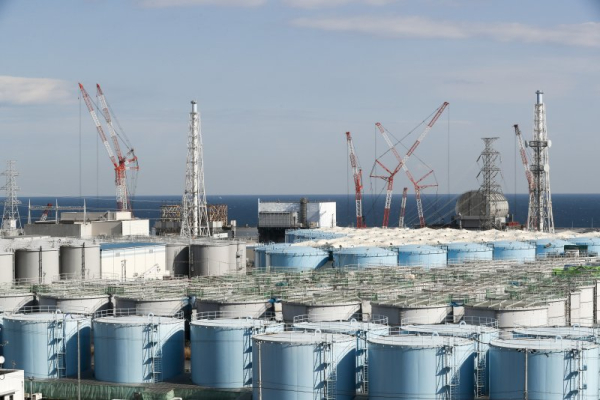

Storage tanks of radiation-contaminated water stood at the tsunami-crippled Tokyo Electric Power Company’s Fukushima Daichi Nuclear Power Plant in Okuma, Fukushima Prefecture, northern Japan in 2019. This week, China began importing seafood after a two-year ban due to concerns over a Japanese plan to release the water back into the sea. File Photo by Kimimasa Mayama/EPA
Japan has resumed shipping seafood to China after a two year ban due to potential radioactive waste concerns, the Japanese government said.
Minoru Kihara, Japan’s chief cabinet secretary, said at a press conference that the government takes it “positively” that six tons of frozen scallops from the island of Hokkaido were shipped to China on Wednesday, Kyodo News reported. There are 1,323 pounds of salted sea cucumbers that will follow on Monday, said farm minister Norikazu Suzuki in a separate press conference on Monday.
“Tokyo will strongly demand Beijing abolish import restrictions on fishery products from the remaining 10 prefectures and resume imports of Japanese beef,” NKH World Japan reported Kihara said.
China suspended imports of Japanese seafood in 2023 after the release of treated radioactive water from the Fukushima nuclear power plant into the sea. The beef ban began after a 2001 outbreak of bovine spongiform encephalopathy, or mad cow disease.
Beijing announced in June that it would allow shipments from 10 prefectures because there were “no abnormalities” detected after long-term international water monitoring and independent sampling and testing by China.
The Fukushima Daiichi Nuclear Power Station was destroyed by an earthquake and tsunami on March 11, 2011. More than 1.3 million metric tons of radioactive water — a combination of contaminated groundwater and water used for cooling reactors — were being stored in more than 1,000 large tanks on the site until the discharge plan began in late August 2023.
The water is gradually released after it was diluted with seawater and treated through a system that removes all nuclides except for tritium, a naturally occurring hydrogen atom that is a relatively weak source of beta radiation. The plan was backed by the United Nations’ International Atomic Energy Agency.
Exporters in Japan must register their facilities with Chinese authorities and provide certificates of radioactivity inspection before shipping fishery products. Only three facilities have been able to export, as registrations for hundreds more are pending, Kyodo News said.
“If any risks are discovered, necessary import restriction measures will be taken immediately in accordance with the law,” said Chinese Foreign Ministry spokesperson Mao Ning at a press conference Friday.